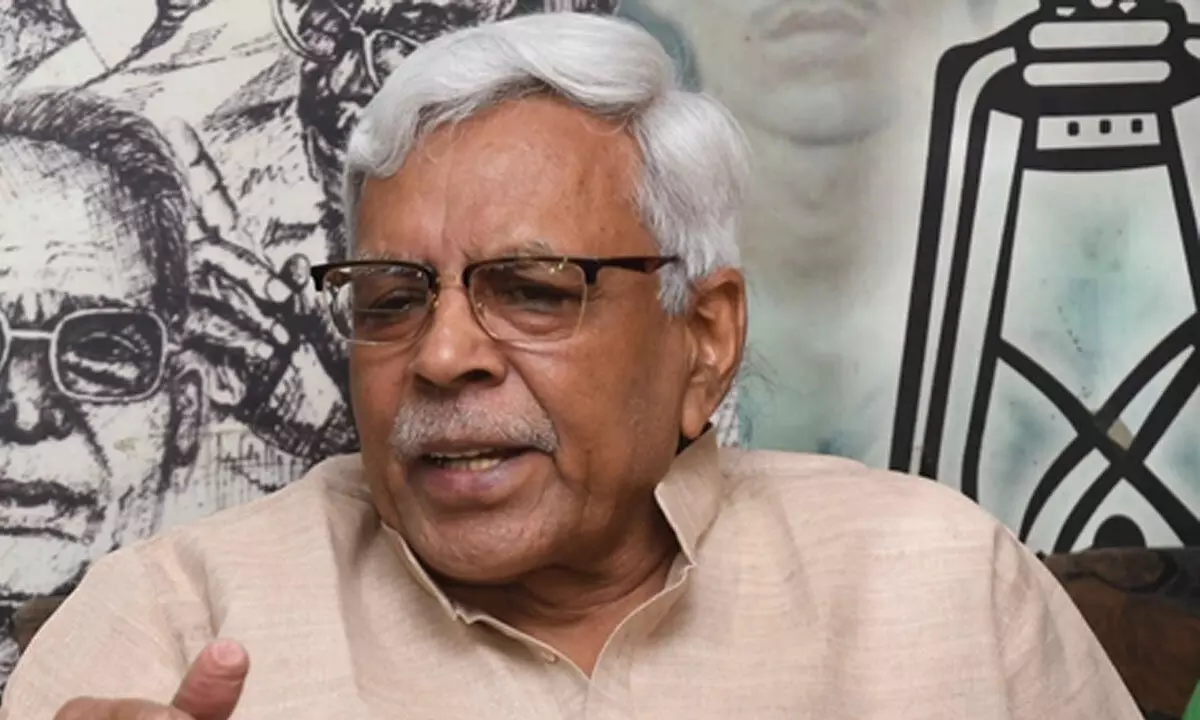Live
- Resolve public grievances on spot: Collector
- 26 gamblers held, Rs. 13.18 lakh seized
- Ajay Devgn’s Singham Again Soars Towards ₹240 Crore, While Bhool Bhulaiyaa 3 Dominates
- Assembly winter session begins today: Oppn to corner govt over mango kernel deaths
- Study shows how human memory works, gets stored
- Shadnagar: Increase Disability Pension To Rs 6,000
- Haryana Guv Dattatreya appreciates KDCCB
- Command over language crucial for students: Pamela Satpathy
- Additional Collector Fyzan Ahmed launches Mahila Sakthi Canteen
- 26/11 Heroes: Unforgettable Acts of Courage That Saved Lives
Just In

Patna: Shivanand Tiwari, the RJD's national Vice President, on Wednesday criticised the ‘One Nation, One Election’ proposal, claiming it is part of an...
Patna: Shivanand Tiwari, the RJD's national Vice President, on Wednesday criticised the ‘One Nation, One Election’ proposal, claiming it is part of an RSS agenda which the BJP is attempting to implement in the country.
Shivanand Tiwari, while speaking to IANS, argued that the ‘One Nation, One Election’ proposal challenges the country's federal structure.
Responding to the NDA's claim that simultaneous elections would reduce the financial burden, Tiwari said: “While BJP leaders boast about India will become the world's third-largest economy, with a multi-trillion-dollar economy and numerous billionaires have been come up under the Modi government, can our country not afford the estimated Rs 4,500 crores required to sustain its democratic processes.”
Shivanand Tiwari emphasised that states like Bihar and Tamil Nadu have significant differences in tradition, culture, language, and infrastructure. He argued that each state faces unique challenges, making separate state elections necessary so people can choose their respective governments.
Tiwari stated that ‘One Nation, One Election’ is not feasible which is why the RJD consistently opposes the concept.
Tiwari further claimed that the BJP introduced the ‘One Nation, One Election’ concept due to uncertainty about its performance in the next election.
“The BJP aimed to win over 400 seats in the Lok Sabha, it only managed to secure around 240 seats. The ‘One Nation, One Election’ concept aligns with the RSS's long-standing ideology of promoting "one nation, one language, one leader, one election,” he said.
“This idea originally stemmed from Jan Sangh and was proposed in 1962, including a plan to merge states and govern through a unified administration. The BJP is appointing governors in states who obstruct the functioning of elected governments in various states and using central investigating agencies against opposition leaders. Their ultimate goal is to centralise power under one leader and one flag,” Tiwari said.
The One Nation One Election Concept proposes simultaneous elections for the Lok Sabha, state assemblies, and other legislative bodies in the country.
Meanwhile, Neeraj Kumar, MLC of JD-U, reiterated his party's support for the ‘One Nation, One Election’. “Our party’s senior and union minister leaders Lalan Singh and national working president Sanjay Jha presented the party's views to the committee led by former President Ram Nath Kovind. JD-U firmly believes this concept would lessen the country's financial burden and eliminate obstacles to development. The implementation is expected in 2029, and if the Bihar Assembly election takes place in 2025, the next government's term would align with the Lok Sabha election in 2029,” he told IANS.
BJP leader and spokesperson Prabhakar Mishra told IANS that ‘One Nation, One Election’ would be a significant decision by the Union government in the public's interest.
He added that Prime Minister Narendra Modi announced the concept during the Independence Day celebration at the Red Fort, urging all political parties to unite on this issue.

© 2024 Hyderabad Media House Limited/The Hans India. All rights reserved. Powered by hocalwire.com






